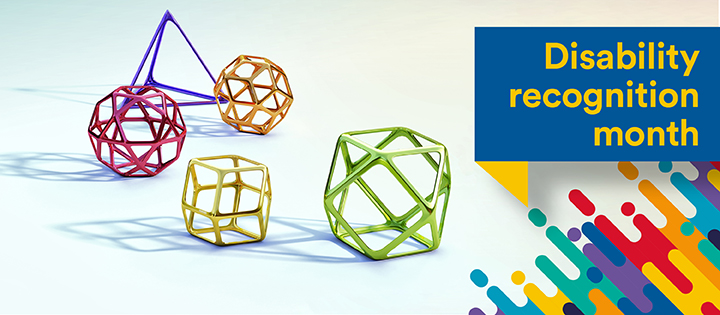
As part of our annual calendar of recognition months, in May we will be focusing on Disability. Supporting our disabled staff and students to reach their full potential and to be able to engage in all aspects of university life and study is a goal within our Equality, Diversity and Inclusion (EDI) Strategic Delivery Plan, and the month of May provides a helpful opportunity for reflection and learning.
This years’ theme is ‘Finding our way’. This theme emerged from discussions with the Chair and Deputy Chair of the Disabled Staff Network where they highlighted that people can still be unclear about where they go to access support, and what information and resources are provided by the university to support disabled people and their managers.
The events this year focus on a range of different issues which have been highlighted as of importance throughout the year. One event focuses on how staff support our disabled students; another provides details on supporting disabled staff which introduces reasonable adjustments and the disability toolkit. There is an event focused on understanding and embracing neurodiversity – neurodiversity is a topic which has been raised in several of the recent Equality, Diversity and Inclusion Q&A sessions that I’ve led across the university, so I was particularly pleased to see this topic included in the programme. Just today, as I write this blog in advance of next week, GCHQ have been in the news regarding their proactive approach to recruiting staff with dyslexia, emphasising the skills in pattern recognition that dyslexic people often demonstrate.
When we completed the Review of Support for Disabled Staff in 2019, we made a commitment to deliver a fully inclusive environment through the social model of disability, and to build our understanding to move beyond this model. This model proposes that people are disabled and excluded by a society which is poorly designed for inclusivity. The onus is therefore on society as a whole – including employers and learning providers – to reduce, remove or alter disabling environments, policies and practices.
We also see Disability Recognition Month as part of our wider goals to provide platforms for disabled people to share their lived experiences, to help raise awareness and understanding amongst the university community and learn about how we can be more inclusive. Lots of the live and recorded events will include hearing disabled staff and student perspectives and experiences, and we will be publishing blogs from disabled alumni throughout May. We are also sharing some great videos produced by members of the Autism Social Network, debunking myths and stereotypes around autism.
Throughout this academic year we have been building on our ‘Let’s be clear about EDI’ programme. The ‘Let’s be clear about EDI’ webinar series produced by the Leadership and Management Academy in conjunction with the Disabled Staff Network, Lauren Marsh and Danielle Ropar, includes topics such as ‘Reasonable adjustments that enable inclusivity’ and ‘Embracing neurodiversity’. Staff are encouraged to either watch the short 30 minute pre-recorded sessions, or to book onto a live webinar taking place later in the year.
I am also pleased to see the network-led events supplemented by local events delivered around the university. These will all be listed in the recently published Campus News article, and include:
- Becoming a Disability Ally - A discussion hosted by the School of Education on how best to be an ally of disabled people, both at work and in the community
- Disability and Learning Experiences: Student Perspectives – Hosted by Nottingham University Business School and aimed at both academic and professional staff, this event aims to increase awareness of a range of cognitive differences such as dyslexia and autism and how they affect student learning.
- Exploring Disability Disclosure and Support among University of Nottingham Staff: Challenges, Barriers and Opportunities – hosted by the Faculty of Medical and Health Sciences, this webinar is open to all staff to explore the barriers to disclosure and highlight the resources and good practice available to support disabled staff and line managers in their duty of care.
- ‘Let’s just talk!’ How disabled colleagues can benefit the whole team – a podcast discussing what it means to have a deep understanding of the social model and draw on learning gained through participants on the Nottingham’s CALIBRE programme.
One of the other goals of all of our recognition months is to simply encourage students and staff to talk about EDI, to learn about each others’ experiences and perspectives, and to build our understanding of how we can embrace difference and diversity in our community. One of the ways I’ve done this is through getting to know many of my students over the years. Due to the long-term nature of a PhD supervision, I have particularly got to know my PhD students, many of whom have held protected characteristics, and at points we have found ourselves discussing how they have impacted their lives and learning, and how I as a supervisor can best support them. I’m therefore very grateful to one of my current PhD students, Abi Fowler, for allowing me to share this transcript of a recorded conversation we had about her dyslexia, and how she was able to be supported.
As always, thanks to all of those involved in delivering these events which involve a tremendous amount of thought, discussion and planning. Please do all take a look at the events programme, and find an event that you are able to attend. I always learn so much from attending the recognition month events, and particularly value the stories that people are often very brave in sharing.
The more we listen to and learn from each others’ experiences, the more we are able to work together to deliver a truly inclusive university environment for us all.
Professor Sarah Sharples
04 May 2021